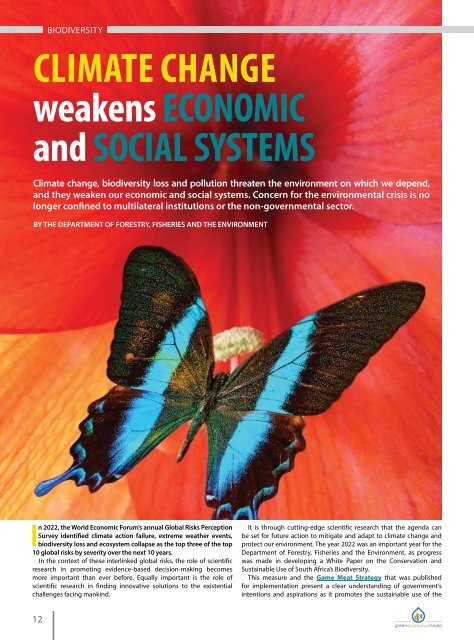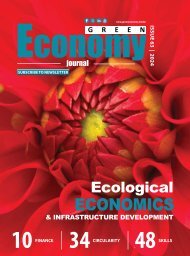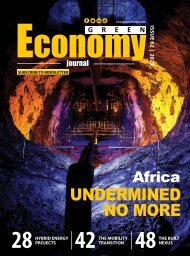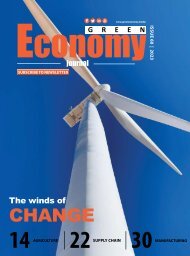You also want an ePaper? Increase the reach of your titles
YUMPU automatically turns print PDFs into web optimized ePapers that Google loves.
BIODIVERSITY<br />
BIODIVERSITY<br />
CLIMATE CHANGE<br />
weakens ECONOMIC<br />
and SOCIAL SYSTEMS<br />
Climate change, biodiversity loss and pollution threaten the environment on which we depend,<br />
and they weaken our economic and social systems. Concern for the environmental crisis is no<br />
longer confined to multilateral institutions or the non-governmental sector.<br />
BY THE DEPARTMENT OF FORESTRY, FISHERIES AND THE ENVIRONMENT<br />
Partnerships are key to<br />
unlocking the full potential<br />
of the biodiversity sector.<br />
country’s natural heritage to enable and facilitate transformative<br />
socioeconomic development while ensuring that biodiversity is<br />
conserved for present and future generations. The overriding message<br />
is that the actions taken today must not only secure ecological<br />
sustainability into the future but must also promote justifiable<br />
economic and social development to reduce poverty, inequality and<br />
unemployment, especially for our rural communities.<br />
The White Paper, which is expected to be adopted for implementation<br />
this year following a public participation process, focuses on a future<br />
in which all South Africans live in harmony with nature, a future in<br />
which our biodiversity sector is transformed, and a future in<br />
which rural communities benefit from access to our rich natural<br />
environment as the country’s biodiversity is conserved. It also aims<br />
to maintain and restore ecological integrity alongside setting out<br />
important principles to guide future policy, legislation and decisionmaking<br />
across the sector.<br />
Partnerships are key to unlocking the full potential of the biodiversity<br />
sector. By doing this, the Department can support training and capacity<br />
building programmes alongside the development of infrastructure,<br />
the donation of wildlife to emerging game farmers, ensuring that<br />
indigenous knowledge holders benefit from the use of natural products,<br />
and securing a means to attract investment to the sector.<br />
At present, seven of the eight financial solutions to catalyse<br />
investment in the biodiversity sector and retain revenue in protected<br />
areas are being supported by the BIOFIN programme in South Africa.<br />
These solutions were initiated in the 2021/22 financial year and<br />
include activating institutional governance and support mechanisms,<br />
such as the Finance Solution Project Management Committee and<br />
task teams for each finance solution.<br />
An international decision that affects the growth of the biodiversity<br />
economy and the conservation estate was the adoption of the<br />
Kunming-Montreal Declaration at the 15th Conference of Parties to<br />
the Convention on Biological Diversity at the end of 2022. This<br />
Conference had also adopted the Global Biodiversity Framework, a<br />
landmark agreement for nature which sets goals aimed at halting<br />
biodiversity loss, the extinction of species and protecting the rights<br />
of local and indigenous communities through fair access and benefitsharing<br />
of genetic resources.<br />
In 2022, the World Economic Forum’s annual Global Risks Perception<br />
Survey identified climate action failure, extreme weather events,<br />
biodiversity loss and ecosystem collapse as the top three of the top<br />
10 global risks by severity over the next 10 years.<br />
In the context of these interlinked global risks, the role of scientific<br />
research in promoting evidence-based decision-making becomes<br />
more important than ever before. Equally important is the role of<br />
scientific research in finding innovative solutions to the existential<br />
challenges facing mankind.<br />
It is through cutting-edge scientific research that the agenda can<br />
be set for future action to mitigate and adapt to climate change and<br />
protect our environment. The year 2022 was an important year for the<br />
Department of Forestry, Fisheries and the Environment, as progress<br />
was made in developing a White Paper on the Conservation and<br />
Sustainable Use of South Africa’s Biodiversity.<br />
This measure and the Game Meat Strategy that was published<br />
for implementation present a clear understanding of government’s<br />
intentions and aspirations as it promotes the sustainable use of the<br />
Through the Game Meat Strategy, there is acknowledgement of<br />
the significant contribution made by the diversity of South Africa’s<br />
wildlife models, and the potential for wildlife businesses to drive<br />
critical elements of the value chain. It supports the move from an<br />
informal industry, towards larger commercial ventures that provide for<br />
economies of scale.<br />
In the last quarter of 2022, the Department launched the<br />
Biodiversity Sector Investment Portal to link investors with<br />
bankable projects as a means of growing the biodiversity economy.<br />
Development of the Investment Portal by the Department was<br />
supported the United Nations Development Programme (UNDP) and<br />
the Biodiversity Finance Initiative (BIOFIN) and promotes investment<br />
opportunities in the sector while encouraging the development of<br />
connections between communities and investor-ready and bankable<br />
intermediaries that will ensure the sector is able to contribute to the<br />
growth of the economy, as well as the wellbeing of society while<br />
conserving our country’s rich biodiversity.<br />
By encouraging investment into businesses that fall within the<br />
broader biodiversity economy, much-needed economic and social<br />
development can be promoted. It can also secure the country’s critical<br />
natural capital.<br />
A key decision of the Kunming-Montreal declaration was,<br />
however, a proposal to increase finance to developing countries to<br />
drive sustainable investment in reversing the loss of biodiversity<br />
as well as prevention of future loss for the planet through<br />
implementation of the framework.<br />
While ambitious in its expression of goals and targets, the decision<br />
falls short in respect of ambition on means of implementation, including<br />
resource mobilisation to close the financing gap of $700-billion,<br />
capacity building, technology and technology transfer. This<br />
commitment will go some way in assisting developing countries<br />
address the burden climate change mitigation and adaptation will<br />
place on already vulnerable economies.<br />
12<br />
13

















